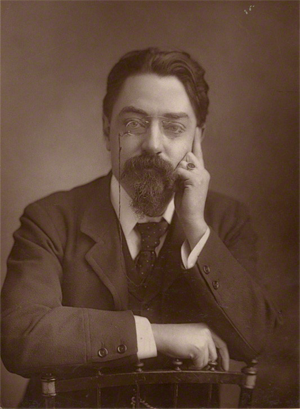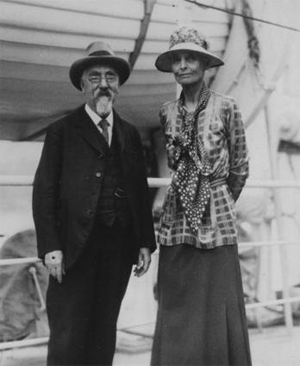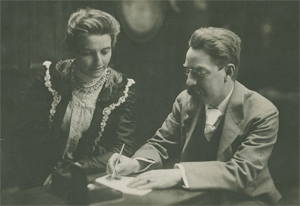by Wikipedia
Accessed: 7/7/19
NOTICE: THIS WORK MAY BE PROTECTED BY COPYRIGHT
YOU ARE REQUIRED TO READ THE COPYRIGHT NOTICE AT THIS LINK BEFORE YOU READ THE FOLLOWING WORK, THAT IS AVAILABLE SOLELY FOR PRIVATE STUDY, SCHOLARSHIP OR RESEARCH PURSUANT TO 17 U.S.C. SECTION 107 AND 108. IN THE EVENT THAT THE LIBRARY DETERMINES THAT UNLAWFUL COPYING OF THIS WORK HAS OCCURRED, THE LIBRARY HAS THE RIGHT TO BLOCK THE I.P. ADDRESS AT WHICH THE UNLAWFUL COPYING APPEARED TO HAVE OCCURRED. THANK YOU FOR RESPECTING THE RIGHTS OF COPYRIGHT OWNERS.

The Right Honourable
The Lord Passfield
OM PC
Carbon print by W. & D. Downey, published in 1893
President of the Board of Trade
In office: 22 January 1924 – 3 November 1924
Monarch George V
Prime Minister Ramsay MacDonald
Preceded by Sir Philip Lloyd-Graeme
Succeeded by Sir Philip Lloyd-Graeme
Secretary of State for Dominion Affairs
In office: 7 June 1929 – 5 June 1930
Monarch George V
Prime Minister Ramsay MacDonald
Preceded by Leo Amery
Succeeded by James Henry Thomas
Secretary of State for the Colonies
In office
7 June 1929 – 24 August 1931
Monarch George V
Prime Minister Ramsay MacDonald
Preceded by Leo Amery
Succeeded by James Henry Thomas
Personal details
Born 13 July 1859
London
Died 13 October 1947 (aged 88)
Liphook, Hampshire
Nationality British
Political party Labour
Spouse(s) Beatrice Potter
(1858–1943)
Alma mater Birkbeck, University of London
King's College London
Sidney James Webb, 1st Baron Passfield, OM, PC (13 July 1859 – 13 October 1947) was a British socialist, economist, reformer and a co-founder of the London School of Economics. He was one of the early members of the Fabian Society in 1884, along with George Bernard Shaw (they joined three months after its inception). Along with his wife Beatrice Webb, Annie Besant, Graham Wallas, Edward R. Pease, Hubert Bland, and Sydney Olivier, Shaw and Webb turned the Fabian Society into the pre-eminent political-intellectual society of England during the Edwardian era and beyond. He wrote the original Clause IV for the British Labour Party.
Background and education
Webb was born in London to a professional family. He studied law at the Birkbeck Literary and Scientific Institution for a degree of the University of London in his spare time, while holding down an office job. He also studied at King's College London, prior to being called to the Bar in 1885.
Professional life
In 1895, he helped to establish the London School of Economics, using a bequest left to the Fabian Society. He was appointed Professor of Public Administration in 1912, a post he held for fifteen years. In 1892, Webb married Beatrice Potter, who shared his interests and beliefs.[1] The money she brought with her enabled him to give up his clerical job and concentrate on his other activities. Sidney and Beatrice Webb founded the New Statesman magazine in 1913.[2]
Political career

Sidney Webb and Beatrice Webb
Webb and Potter were members of the Labour Party and took an active role in politics. Sidney became Member of Parliament for Seaham at the 1922 general election.[3] The couple's influence can be seen in their hosting of the Coefficients, a dining club which attracted some of the leading statesmen and thinkers of the day. In 1929, he was raised to the peerage as Baron Passfield, of Passfield Corner in the County of Southampton.[4] He served as both Secretary of State for the Colonies and Secretary of State for Dominion Affairs in Ramsay MacDonald second Labour Government in 1929. As Colonial Secretary he issued the Passfield White Paper revising the government's policy in Palestine, previously set by the Churchill White Paper of 1922. In 1930, failing health caused him to step down as Dominions Secretary, but he stayed on as Colonial Secretary till the fall of the Labour government in August 1931.
Ignoring mounting evidence of the atrocities committed by Joseph Stalin, the Webbs were supporters of the Soviet Union until their deaths. Having reached their seventies and early eighties, their books Soviet Communism: A New Civilisation? (1935) and The Truth About Soviet Russia (1942) give a very positive assessment of Joseph Stalin's regime. Trotskyist historian Al Richardson later described Soviet Communism: A New Civilization? as "pure Soviet propaganda at its most mendacious".[5]
Writings
Webb co-authored, with his wife, a pivotal book on The History of Trade Unionism (1894). For the Fabian Society he wrote on poverty in London,[6] the eight-hour day,[7][8] land nationalisation[9] the nature of socialism,[10] education,[11] eugenics[12] and reform of the House of Lords.[13] He also drafted Clause IV, which committed the Labour Party to public ownership of industry.
References in literature

Beatrice and Sidney Webb working together in 1895
In H. G. Wells' The New Machiavelli (1911), the Webbs, as "the Baileys", are mercilessly lampooned as short-sighted, bourgeois manipulators. The Fabian Society, of which Wells was briefly a member (1903–08), fares no better in his estimation.
In her diary, Beatrice Webb records that they have "read the caricatures of ourselves … with much interest and amusement. The portraits are very clever in a malicious way."[14] She reviews the book and Wells' character in detail, summarising: "As an attempt at representing a political philosophy the book utterly fails …".[15]
Personal life
When Beatrice Webb died in 1943, the casket containing her ashes was buried in the garden of their house in Passfield Corner. Lord Passfield's ashes were also buried there in 1947. Shortly afterwards, George Bernard Shaw launched a petition to have both reburied to Westminster Abbey, which was eventually granted. Today, the Webbs' ashes are interred in the nave of Westminster Abbey, close to those of Clement Attlee and Ernest Bevin.
He and his wife were friends with the philosopher Bertrand Russell.[16]
In 2006, the London School of Economics, alongside the Housing Association landlord Places for People, renamed their Great Dover Street student residence Sidney Webb House in his honour.
Archives
Sidney Webb's papers are among the Passfield archive at the London School of Economics. Posts about Sidney Webb regularly appear in the LSE Archives blog, Out of the box.
Bibliography
Works by Sidney Webb
• Facts for Socialists (1887)
• Fabian Essays in Socialism – The Basis of Socialism – Historic(1889)
• A plea for an eight hours bill (1890)
• English progress towards social democracy (1890)
• Practicable land nationalization (1890)
• The workers' political programme (1890)
• What the farm laborer wants (1890)
• A Labour policy for public authorities (1891)
• London's neglected heritage (1891)
• London's water tribute (1891)
• Municipal tramways (1891)
• The municipalisation of the gas supply (1891)
• The reform of the poor law (1891)
• The scandal of London's markets (1891)
• The "unearned increment" (1891)
• Socialism : true and false (1894)
• The London vestries : what they are and what they do : with map, table of vestries, etc. (1894)
• The difficulties of individualism (1896)
• Labor in the longest reign (1837-1897) (1897)
• Problems of Modern Industry (1898)
• The economics of direct employment (1898)
• Five years' fruits of the Parish Councils Act (1901)
• The education muddle and the way out (1901)
• Twentieth century politics : a policy of national efficiency (1901)
• The Education Act, 1902 : how to make the best of it (1903)
• London Education (1904)
• The London Education Act, 1903 : how to make the best of it(1904)
• Paupers and old age pensions (1907)
• The decline in the birth-rate (1907)
• Grants in Aid: A Criticism and a Proposal (1911)
• The necessary basis of society (1911)
• Seasonal Trades, with A. Freeman (1912)
• What about the rates? : or, Municipal finance and municipal autonomy (1913)
• The War and the workers : handbook of some immediate measures to prevent unemployment and relieve distress (1914)
• The Restoration of Trade Union Conditions (1916)
• When peace comes : the way of industrial reconstruction (1916)
• The reform of the House of Lords (1917)
• The teacher in politics (1918)
• National finance and a levy on capital (1919)
• The root of labour unrest (1920)
• The constitutional problems of a co-operative society (1923)
• The Labour Party on the threshold (1923)
• The need for federal reorganisation in the co-operative movement(1923)
• The Local Government Act, 1929 - how to make the best of it(1929)
• What happened in 1931 : a record (1932)
Works by Sidney and Beatrice Webb
• History of Trade Unionism (1894).
• Industrial Democracy (1897); translated into Russian by Lenin as The Theory and Practice of British Trade Unionism, St Petersburg, 1900.
• English Local Government (1906 through 1929) Vol. I–X
• The Manor and the Borough (1908)
• The Break-Up of the Poor Law (1909)
• English Poor-Law Policy (1910)
• The Cooperative Movement (1914)
• Works Manager Today (1917)
• The Consumer's Cooperative Movement (1921)
• Decay of Capitalist Civilization (1923)
• Methods of Social Study (1932)
• Soviet Communism: A new civilisation? (1935, Vol I Vol II) (the 2nd and 3rd editions of 1941 and 1944 did not have "?" in the title)
• The Truth About Soviet Russia (1942)
Notes
1. "Sidney and Beatrice Webb | British economists". Encyclopedia Britannica. Retrieved 25 August 2017.
2. The world movement towards collectivism, Beatrice and Sidney Webb, New Statesman, 12 April 1913;
Bending the arc of history towards justice and freedom, New Statesman, 12 April 2013; retrieved 13 May 2014.
3. The History of the Fabian Society, Edward R. Pease, Frank Cass and Co. LTD, 1963
4. "No. 33509". The London Gazette. 25 June 1929. p. 4189.
5. Al Richardson, "Introduction" to C. L. R. James, World Revolution 1917–1936: The Rise and Fall of the Communist International. Humanities Press, 1937 ISBN 0-391-03790-0
6. Webb, Sidney (1889), "Facts for Londoners: An exhaustive collection of statistical and other facts relating to the metropolis: with suggestions for reform on socialist principles", Fabian Tract, 8
7. Webb, Sidney (May 1890), "An Eight Hours Bill in the form of an amendment of the Factory Acts, with further provisions for the improvement of the conditions of labour", Fabian Tract, 9
8. Webb, Sidney (1891), "The case for an Eight Hours Bill", Fabian Tract, 23
9. Webb, Sidney (1890), "Practicable land nationalization", Fabian Tract, 12
10. Webb, Sidney (21 January 1894), "Socialism: true and false. A lecture delivered to the Fabian Society", Fabian Tract, 51
11. Webb, Sidney (1901), "The education muddle and the way out: a constructive criticism of English educational machinery", Fabian Tract, 106
12. Webb, Sidney (1907), "The decline in the birth-rate", Fabian Tract, 131
13. Webb, Sidney (1917), "The reform of the House of Lords", Fabian Tract, 183
14. Beatrice Webb's typescript diary, 2 January 1901 – 10 February 1911, LSE Digital Library http://digital.library.lse.ac.uk/object ... 2/mode/2up
15. Beatrice Webb's typescript diary, 2 January 1901 – 10 February 1911, LSE Digital Library http://digital.library.lse.ac.uk/object ... /mode/2up/
16. Autobiography of Bertrand Russell (London:Allen and Unwin, 1969).
Further reading
• Bevir, Mark. "Sidney Webb: Utilitarianism, positivism, and social democracy." Journal of Modern History 74.2 (2002): 217-252. online
• Cole, Margaret, et al. The Webbs and their work (1949).
• Davanzati, Guglielmo Forges, and Andrea Pacella. "Sidney and Beatrice Webb: Towards an Ethical Foundation of the Operation of the Labour Market." History of Economic Ideas (2004): 25-49.
• Farnham, David. “Beatrice and Sidney Webb and the Intellectual Origins of British Industrial Relations.” Employee Relations (2008). 30: 534-52
• Harrison, Royden. The Life and Times of Sydney and Beatrice Webb, 1858-1905 (2001)
• Kaufman, Bruce E. "Sidney and Beatrice Webb's Institutional Theory of Labor Markets and Wage Determination." Industrial Relations: A Journal of Economy and Society 52.3 (2013): 765-791. online
• MacKenzie, Norman Ian, and Jeanne MacKenzie. The First Fabians (Quartet Books, 1979).
• Radice, Lisanne. Beatrice and Sidney Webb: Fabian Socialists (Springer, 1984).
• Stigler, George. “Bernard Shaw, Sidney Webb, and the Theory of Fabian Socialism,” Proceedings of the American Philosophical Society (1959) 103#3: 469-75.
Primary sources
• Mackenzie, Norman,ed. The Letters of Sidney and Beatrice Webb (3 volumes. Cambridge University Press, 1978. Pp. xvii, 453; xi, 405; ix, 482).
o Volume 1, Apprenticeships 1873-1892. (1978).
o Volume 2. Partnership 1892-1912 (1978).
o Volume 3: Pilgrimage, 1912–1947 (1978).
External links
• Hansard 1803–2005: contributions in Parliament by Sidney Webb
• Critique of Webb by Leon Trotsky in The Revolution Betrayed
• The Webb Bibliography
• The Webb Diaries available in full from LSE
• Works by Sidney Webb at Project Gutenberg
• Works by or about Sidney Webb at Internet Archive
• Newspaper clippings about Sidney Webb, 1st Baron Passfield in the 20th Century Press Archives of the German National Library of Economics
